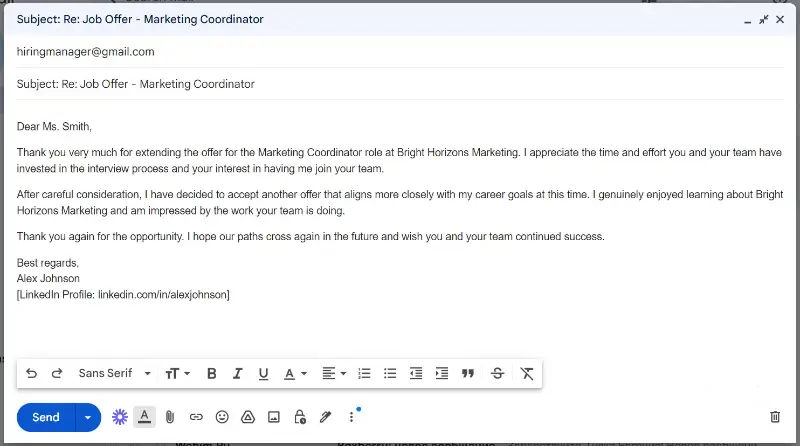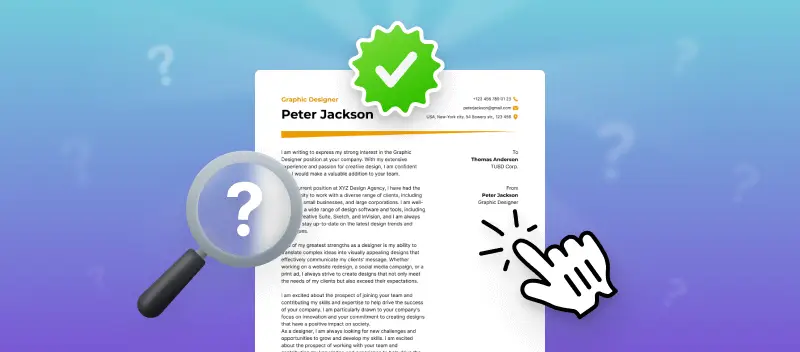Starting a new job is often filled with anticipation, excitement, and the hope of new opportunities. But what happens when the reality doesn't match the expectations?
Whether it's misalignment with your career goals or a better offer elsewhere, sometimes to quit a job you just started becomes the best decision for your well-being and professional trajectory.
This article will walk you through the essential steps on how to politely quit a job you just started. We will guide you from assessing your decision to crafting the resignation letter, so you can move forward with confidence and integrity.
Can you quit a job you just started?
Quitting a new job can be a difficult decision. While it may seem abrupt, there are situations where it might be the right choice for your personal and professional life. It's important to weigh the pros and cons to make an informed decision.
Pros:
- Personal well-being. If the job is causing undue stress or affecting your mental or physical health, quitting can help you prioritize your well-being.
- Career alignment. Leaving a position that doesn’t align with your career goals or values allows you to seek opportunities that are a better fit.
- Long-term unhappiness. Resigning early can prevent prolonged dissatisfaction and unhappiness in a role that isn't suitable for you.
- Better opportunities. It frees you up to pursue better job opportunities that may arise.
- Toxic environment. Stepping away from a hostile or unprofessional workplace can protect your self-esteem and productivity.
Cons:
- Professional reputation. Quitting a job you just started can be viewed negatively by future employers, potentially impacting your career.
- Networking impact. Leaving early might strain relationships with colleagues and supervisors, which can affect your professional network.
- Financial instability. If you don't have another job lined up, quitting can lead to financial uncertainty.
- Resume impact. Short stints at jobs can be seen as a red flag on your resume, suggesting a lack of commitment or reliability.
- Adjustment period. Some roles require an adjustment period; quitting too soon may mean you didn’t give yourself enough time to acclimate to the new position.
- Burned bridges. An early exit without proper communication may damage relationships or lead to negative references in the future.
Overall, before wondering how to quit a new job, carefully considering the potential benefits and drawbacks will help ensure you make the best decision for your circumstances.
Reasons to quit a job you just started
Sometimes, you might find yourself questioning whether the job is truly the right fit. If you’re contemplating how to to leave a job you’ve just started, here are some reasons that might justify making that decision.
Toxic work environment
A healthy work environment is crucial for your overall well-being and productivity. If you find yourself in pervasive negativity, bullying, or harassment, it’s essential to prioritize your mental health.
Misalignment with job expectations
One of the most frustrating scenarios is discovering that the job you were hired for is significantly different from what was advertised.
If the responsibilities or role you’re performing diverge from what was described during the hiring process, this can lead to a lack of engagement. In such cases, it may be worth considering quitting a job after a couple weeks.
Unethical practices
If you uncover unethical or illegal practices within the company, continuing to work there could compromise your integrity and professional reputation.
Examples of what you might encounter:
- Falsifying financial records or reports to mislead stakeholders or regulatory bodies.
- Racial, gender, age, or disability discrimination in hiring, promotions, or job assignments.
- Ignoring safety regulations and failing to provide necessary protective equipment.
- Failing to pay overtime wages as required by law.
- Not providing legally mandated breaks or meal times.
- Dumping hazardous waste improperly or failing to follow disposal regulations.
- Unauthorized access to or sharing of confidential client or employee data.
- Using misleading advertising or deceptive sales tactics to manipulate customers.
Reporting these practices and quitting your new job in this organization may be the right course of action to align with your ethical standards.
Health issues
Your health should always come first. If the job is negatively impacting your physical or mental health—whether due to stress, long hours, or unsafe conditions—it’s crucial to prioritize yourself.
Better opportunity
Sometimes, a new job opportunity arises that is too good to ignore. If you receive a job offer for a role that significantly improves your career prospects, aligns better with your goals, or offers better compensation, it might be worth making the switch.
Lack of support
Effective training is essential for performing your job effectively.
If your new employer fails to provide the necessary resources or guidance, it can hinder your ability to succeed and lead to frustration.
If this lack of support seems unlikely to change, finding a role where you can receive adequate training might be a better option.
Poor management
Management plays a critical role in job satisfaction. If you encounter micromanagement or ineffective leadership, it can be a reason to quit a job you just started.
- What is micromanagement?
- It's a management style that typically involves overseeing every small detail of a task or project, rather than allowing employees the autonomy to make decisions or handle their responsibilities independently.
Incompatible work-life balance
Achieving a healthy work-life balance is crucial for personal happiness and productivity. If your job demands excessively long hours or imposes a rigid schedule that disrupts your personal life, it might not be sustainable in the long term.
Company instability
Job security is a key factor in career satisfaction. If you notice signs of financial instability, frequent layoffs, or other indicators of an organization’s uncertain future, it might be wise to look for a more stable position.
How to quit a job you just started?
Quitting new jobs can be tricky, but handling it with professionalism and grace can make a big difference. Below is a step-by-step guide on how to resign from a job you just started.
1. Review your contract
Understanding the terms of your employment is key. Check your offer letter or employment contract for any stipulations regarding important terms.
Key details to pay attention to:
- The notice period required for resignation.
- Any terms related to the probationary period.
- Specific steps or formats for submitting your resignation.
- Severance pay, unused vacation days, or other compensation.
- Any non-compete or confidentiality agreements.
- Policies regarding the return of company property, such as laptops, phones, or access cards.
- Details about your final paycheck and the status of any benefits, such as health insurance.
- Procedures for conducting an exit interview, if applicable.
Knowing this information will help you proceed in a manner that aligns with the agreement you made when you accepted the job.
2. Prepare your explanation
When you decide to resign, be ready to articulate your reasons for leaving a job clearly. While honesty is important, it's equally essential to present your decision diplomatically.
Focus on how the role isn’t the right fit for you, rather than criticizing the company or its employees.
This approach will help you maintain a positive relationship with your employer.
3. Request a meeting
The next step is to arrange a private meeting with your direct supervisor or manager. Handling this conversation in person, or via video call if necessary, demonstrates respect and professionalism.
Face-to-face interaction allows for a more personal and respectful discussion than an email or letter alone.
During your meeting, clearly state your intention to resign. For example, you might say:
"After careful consideration, I’ve concluded that this role isn’t the best fit for me. I’m grateful for the opportunity but believe it’s best for both myself and the team if I step down."
If possible, offer to help with the transition process. This could involve completing outstanding projects or documenting your work to ensure a smooth handover.
4. Resignation letter
Following your conversation, submit a formal resignation letter to document your departure. Keep it brief and professional, clearly stating your last working day and expressing gratitude for the opportunity.
Sample resignation letters for reference:
Dear Ms. Smith,
I hope this message finds you well. I am writing to formally resign from my position as Marketing Coordinator at Acme Solutions, effective August 16, 2024.
I have given this decision considerable thought, and while I have only recently joined the team, I have realized that this role does not align with my career goals and aspirations as I initially hoped. This has been a difficult decision, as I value the opportunity and the welcoming environment provided by you company.
I am committed to ensuring a smooth transition and am more than willing to assist in any way I can during my notice period. Please let me know how I can help with transferring my responsibilities or training a replacement.
Thank you for the opportunity and for your understanding of my decision. I hope to stay in touch and wish Acme Solutions continued success in the future.
Sincerely,
Richard Castillo
5. Prepare for various reactions
Your employers and colleagues may express understanding, disappointment, or even frustration. Regardless of their response, maintain your professionalism and composure throughout the process.
FAQ
- Is it bad to quit a job after a week?
- It might raise concerns for future employers about your commitment or stability. However, if unforeseen circumstances arise, it’s better to quit a job you just started than to stay in a role that doesn’t align with your values.
- How soon should I notify my employer if I want to quit?
- Give as much notice as possible, ideally two weeks, but follow the notice period outlined in your contract.
- Can I quit a job i just started without impacting my future job prospects?
- It might be concerning for future employers, but if explained properly, it usually won’t be a major issue.
- How to quit a job you just started during probation period?
- Even during probation, you should follow the same professional standards for resigning.
- Can I leave without giving notice?
- It’s possible, but it’s generally better to give notice as it helps maintain a good relationship and professional reputation.
- What if I have received training or company benefits?
- Ensure you understand any implications related to training costs or benefits, and discuss them with your HR department.
- How should I address this in future job interviews?
- During the interview, focus on what you learned from the experience and how it helped clarify your career goals.
Conclusion
Leaving a job you just started is never an easy decision, but sometimes it’s necessary for your personal and professional growth. By approaching the situation thoughtfully you can navigate this transition smoothly.
Remember to carefully assess your reasons for leaving, communicate openly and respectfully with your employer, and plan your next steps strategically.
Taking control of your career path means making tough decisions. Knowing how to quit a job you just started that isn’t right for you can open doors to better opportunities. Always prioritize your well-being and move forward with confidence.






